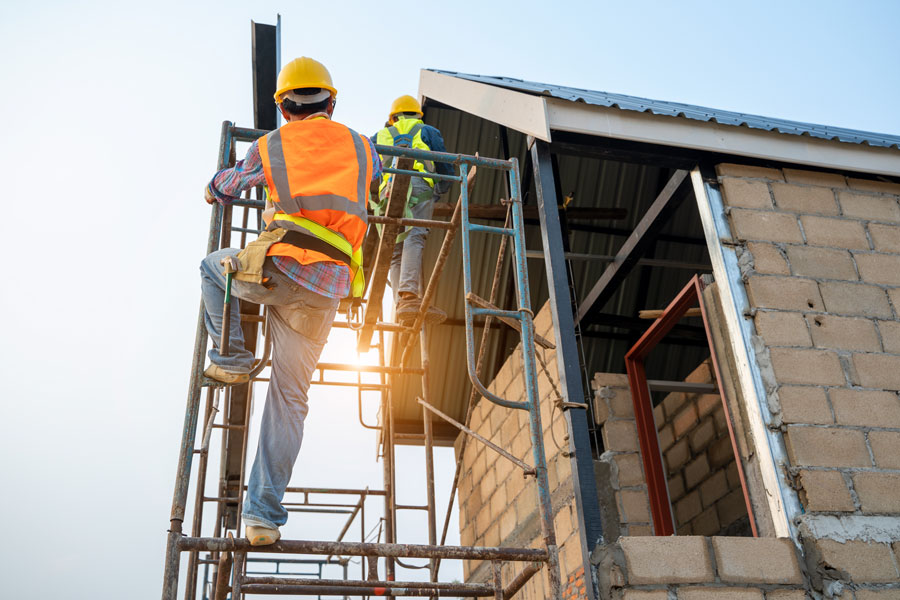
NEW YORK, NY – A new bill in Albany would suspend New York’s 140-year-old “Scaffold Law” for projects in Nassau and Suffolk counties, replacing the state’s unique “absolute liability” rule with a comparative-negligence standard on Long Island. The measure, introduced Sept. 26 by Assembly Member Ari Brown (R-Cedarhurst) as A9128, was referred to the Assembly Labor Committee.
WHAT THE BILL DOES
Under current Labor Law §240, property owners and contractors are strictly liable for gravity-related injuries (e.g., falls from ladders, scaffolds, hoists) regardless of a worker’s own negligence. A9128 would bar §240’s absolute-liability standard from applying to any public or private construction project in Nassau or Suffolk and direct courts to determine fault using New York’s comparative-negligence rules instead. The bill text also clarifies that OSHA and other safety obligations remain in force.
WHY IT’S BEING PROPOSED
Supporters argue New York’s one-of-a-kind liability regime inflates insurance premiums, deters bidders, and drives up the cost of infrastructure and housing. Brown previewed the regional carve-out proposal earlier this month, framing it as a way to lower costs and keep projects on Long Island competitive.
Industry coalitions and trade groups have separately pushed federal and state reforms this year, citing higher premiums, fewer willing carriers, and underwriting constraints tied to §240 exposures.
THE OPPOSITION
Labor organizations and trial-law groups counter that §240 saves lives by forcing owners and contractors to maintain safe sites and provide fall protection. They oppose rollbacks, warning any carve-out would weaken deterrence and shift costs onto injured workers. (Recent statements by the New York State AFL-CIO and allied groups reflect this stance, though not all were specific to the Long Island bill.)
FEDERAL PUSH AND RECENT LAWSUITS
At the federal level, Rep. Nick Langworthy’s Infrastructure Expansion Act (H.R. 3548) seeks to preempt New York’s absolute-liability rule on federally funded or federally permitted projects statewide; the bill is backed by national business groups and some construction associations.
Separately, Newsday has reported this year on racketeering and fraud lawsuits alleging staged accidents and unnecessary surgeries involving Long Island medical providers – cases cited by reform advocates as evidence of system abuse. (Licensing and workers’ comp restrictions have followed for some physicians named in those stories.)
WHAT’S NEXT
A9128 must advance through committee before any floor action in the Assembly; no companion bill has been publicly detailed in the Senate as of publication. Coverage indicates Long Island lawmakers and civic groups will lobby for the carve-out, while labor and plaintiff-bar organizations prepare to oppose it. New York State Assembly+1
§240 LIABILITY IN NASSAU & SUFFOLK
| Key Detail | What to Know |
|---|---|
| Bill | A9128 (2025–26) — limits §240 absolute liability in Nassau & Suffolk |
| Sponsor | Asm. Ari Brown (R-Cedarhurst) |
| Introduced | Sept. 26, 2025; sent to Assembly Labor Committee |
| Core Change | Replaces absolute liability with comparative negligence for elevation/gravity-related injuries on Long Island projects |
| Scope | All public & private construction in Nassau and Suffolk counties |
| Safety Duties | OSHA and other safety laws still apply |
| Opposition | Labor/trial-law groups say rollback would reduce safety |
| Related Effort | Federal H.R. 3548 would preempt §240 on federally funded/permitted projects statewide |
Sources: NYS Assembly bill text; Newsday coverage; US Chamber/NECA summaries of H.R. 3548; industry briefs; prior reporting on alleged staged-accident schemes.
Q&A: §240 SCAFFOLD LAW ON LONG ISLAND
What exactly changes under A9128?
If enacted, courts in Nassau and Suffolk would apportion fault in gravity-related construction accidents instead of automatically assigning full liability to owners/contractors. That aligns Long Island with the comparative-negligence approach used elsewhere in New York tort law. OSHA and other safety obligations would still apply.
Does this affect projects outside Long Island?
No. The bill explicitly limits the change to Nassau and Suffolk. New York City and upstate projects would still operate under §240 unless separate legislation passes.
Is New York really the only state with this kind of law?
Yes – New York remains the last state with an absolute-liability scaffold statute for elevation risks; other states moved to comparative standards decades ago.
Would a federal bill make A9128 unnecessary?
H.R. 3548 would apply to federally funded or federally permitted projects statewide, but not purely private, non-federal projects. A9128 would cover both public and private projects on Long Island regardless of federal involvement, so the proposals are complementary, not duplicative.
Why are premiums such a flashpoint?
Brokers and carriers say §240 shifts risk in ways that raise general liability costs and limit market capacity, particularly downstate. Critics dispute the magnitude of those effects and argue transparency and enforcement – not liability changes – are the fix.
What prompted the “staged accident” claims?
Recent federal civil filings and investigative reporting describe alleged schemes in which falls were orchestrated and medical procedures inflated to influence settlements. Some providers named in these matters have since faced workers’ comp or licensing actions.


